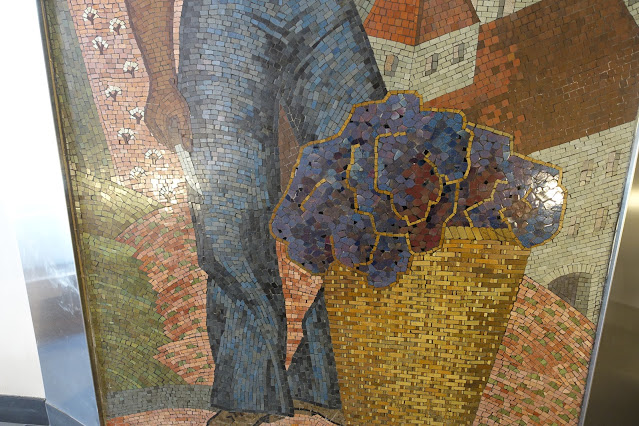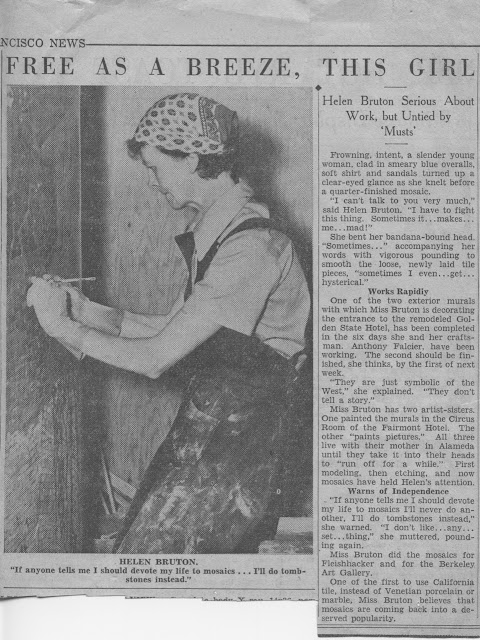Helen Bruton's "City" and "Country" mosaics
 |
| Helen Bruton City (1937) Hotel Union Square, San Francisco |
In 1937, Helen Bruton received a rare and coveted commercial commission when she was hired to create two large mosaics on the exterior of the Golden State Hotel at 114 Powell Street near Union Square in San Francisco. Photographs from the period reveal that the hotel had a wide entrance with two sets of doors set into an impressive art deco facade with illuminated columns. Helen’s mosaics, each measuring seven and a half feet wide and twelve feet tall, were installed on opposite sides of the entryway (see photo below).
 |
| Helen Bruton City (left) and Country (right) Golden State Hotel, 1937 Photograph courtesy Barbara Carroll |
 |
| Helen Bruton Country (1937) |
 |
| Helen Bruton City (1937) |
 |
Helen was interviewed by the San Francisco News while she was installing her mosaics at the Golden State Hotel. The resulting article, which featured a photograph of Helen dressed in dirty overalls and work gloves with a bandana wrapped around her head, captured her during a phase of the project that was particularly tricky and required enormous concentration. Helen’s frustration is clearly evident. “I can’t talk to you very much,” she barked to the reporter as she pounded the wall to smooth the tiles. “I have to fight this thing. Sometimes it… makes… me...mad! … Sometimes… I even… get… hysterical.”[2] Despite Helen’s obvious mastery of the medium, she indignantly emphasized that she was an artist, not just a mosaicist: “‘If anyone tells me I should devote my life to mosaics I’ll never do another. I’ll do tombstones instead,’ she warned. ‘I don’t like… any… set… thing,’ she muttered, pounding again.”[3]
 |
| San Francisco News, May 21, 1937, p. 25. |
Like most of Helen’s works, her mosaics for the Golden State Hotel feel both ancient and timeless -- the figures are classical in dress and posture, and bring to mind the figures in Egyptian hieroglyphs. Yet at the same time, the mosaics are fresh and modern in their simple treatment of color, pattern, and form. They would be at home in a villa in Pompeii, or they could have been made just yesterday. Helen felt that mosaic has endless possibilities “as a medium for modern expression... the very limitations of the medium demand a simplified and formal treatment.”[4] In other words, mosaics have the unique ability to appear ancient and “formal” while at the same time feeling modern and “simple.” Mosaicist Jeanne Reynal, a contemporary of the Brutons’, concurred, saying that “mosaics do not belong to a time but a human need of exceptional duration.”[5]
The Golden State Hotel is now called the Hotel Union Square. It is a much humbler establishment with a single door and no facade; it is easy to walk by without noticing it.
Helen’s mosaics can no longer be seen from the street, but against all odds, they have survived. These extremely heavy yet delicate pieces were successfully removed from their original locations on the exterior of the building and re-installed inside the hotel. The mosaics are positioned directly across from each other in a narrow hallway just inside the entrance. Unfortunately their current position does not allow the viewer to step back and admire these beautiful pieces from a distance. However, it is remarkable and admirable that someone went to the trouble and expense to save these mosaics when it would have been much easier to demolish them. The City and Country mosaics are arguably some of Helen Bruton's best work -- so stop inside the hotel and take a look if you are in the Union Square area.
Unless otherwise noted, all photographs are by the author.
[1] “Free as a breeze, this girl,” San Francisco News, May 21, 1937, p. 25.
[2] Ibid, p. 25.
[3] Ibid, p. 25.
[4] Helen Bruton, “Mosaic as a modern expression,” San Francisco Art Association Bulletin, Oct. 1936, p. 4.
[5] Quoted in Eleanor Munro, Originals: American Women Artists (New York: Simon and Schuster, 1982), p. 178.






Love these mosaics. I hope that they are open for the public to see.
ReplyDeleteLove these mosaics. I hope that they are open for the public to see.
ReplyDeleteLove these mosaics. I hope that they are open for the public to see.
ReplyDeleteThese mosaics are some of my favorites as well. The last time I visited San Francisco a few weeks ago, the Hotel Union Square was closed to the public while it serves as a Covid "shelter in place" facility. I hope the hotel will reopen soon so that we can see the mosaics again!
Delete